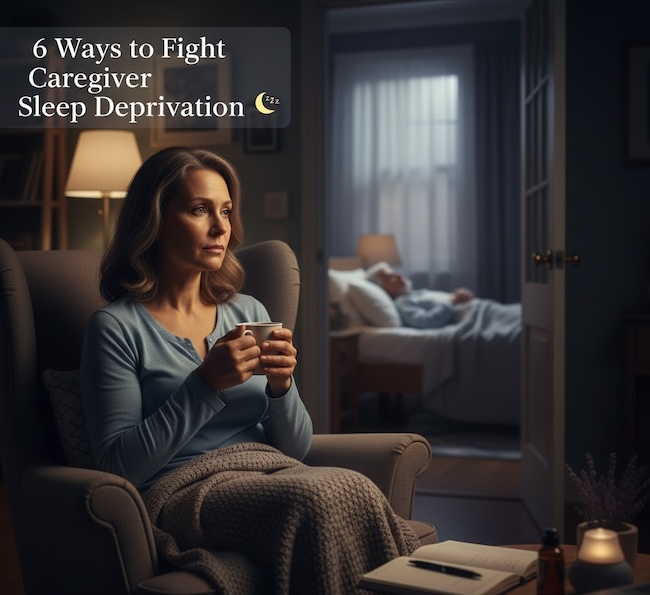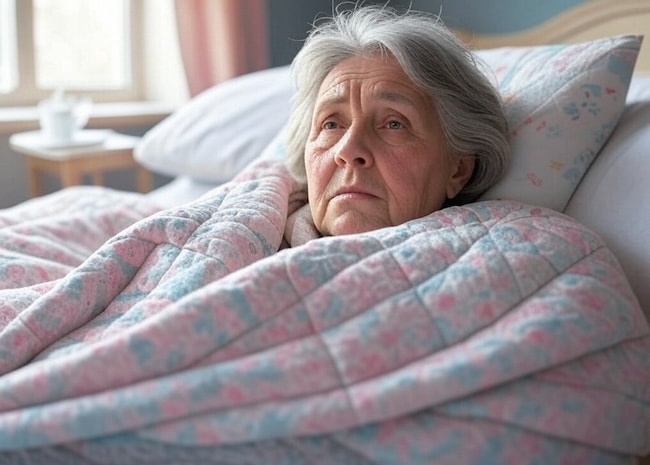To slow the spread of the flu, COVID-19, Norovrus and other highly spreadable infections, you may feel safer sheltering in place with a loved one.
For most of us, this means staying at home for protection and going out only for food or medicine, to provide care, or to exercise outdoors while maintaining 6 feet of distance from others.
Since seniors are at high risk of developing serious complications or dying from highly infectious diseases, staying home minimizes their exposure to viruses and reduces their chance of getting sick.
We share 8 practical tips to keep you and your older adult as safe (and sane) as possible.
8 Tips to Stay Safe During Flu, Covid, or Noro Outbreaks
1. Reduce risk from essential errands like getting food or medicine
At some point, you’ll have to leave the house to buy groceries, get basic supplies, and pick up medication refills.
It’s wise to take a few precautions to reduce the amount of germs you’ll be bringing back into the house.
Reduce shopping trips and time spent in stores
First, here are 3 ways to reduce the number of trips you’ll need to make, the stores you’ll need to visit, and the time you'll need to be out.
The less total time you spend outside, the fewer germs you’ll be exposed to.
Use pharmacy delivery services
Many pharmacies offer delivery services – some are even free.
Switching to an online pharmacy like PillPack or PhilRx eliminates the need to visit a brick-and-mortar pharmacy. Just know that they’re typically unable to fulfill Schedule II medications that seniors commonly use, like opioid painkillers.
If you use an independent pharmacy, call to find out about their delivery options.
Order household essentials in bulk online
If your budget allows, you might want to order essential basics online in bulk from retailers such as Target, Amazon, Walmart, Costco, or Jet.com.
Items such as toilet paper, facial tissue, paper towels, moist wipes, and incontinence supplies are essential when caring for an older adult and can be stored indefinitely.
Plus, having a 2-week or 1-month supply on hand can give you peace of mind that you won’t run out the next time people start panic-buying.
Consider grocery delivery services
Many major chain grocery stores offer delivery services. In addition, dedicated grocery delivery services like Instacart can shop from a variety of stores.
“Decontaminate” yourself after going out in public
After going to the store, many people worry about bringing germs back into the house and passing them along to an older adult.
We’ve got additional suggestions for how you can reduce the amount of germs coming into the home, but this doesn’t mean you have to put all of these ideas into practice.
They’re meant to give you ideas and help you become more aware of how germs could potentially spread.
Everyone needs to decide for themselves which precautions they feel are reasonable and necessary.
Follow basic CDC recommendations
Generally, you should follow the CDC’s recommendations for high-risk individuals, including older adults.
That includes diligent, proper handwashing for 20 seconds, avoiding touching your face, and sanitizing high-touch surfaces such as your mobile phone, doorknobs you touch on your way in, and countertops where you place your purchases.
Beyond practicing good hygiene based on CDC recommendations and following any specific recommendations from your older adult’s doctor, there are no clear-cut right or wrong actions.
Additional ideas
In addition to CDC recommendations, you might consider doing some of these things as soon as you enter the house:
- Put your shopping bags and/or handbag in a dedicated, out-of-the-way corner or near the door, limiting their contact with the rest of the home
- Remove shoes and/or wear dedicated indoor shoes or slippers
- Wash your face, hands, and forearms
- Pull back your hair to reduce the likelihood that you’ll need to touch it or that it will brush against your older adult
- Clean your mobile phone with a 70% alcohol wipe
- Remove all rings and/or bracelets before washing hands, and don’t wear them while in the house, in case virus particles could be hiding on or under them
- Take off all your clothing and put it directly into the laundry, wash your hands, and put on fresh “indoor” clothes
- Take a shower (wash your hair too) and change clothes, putting the “outdoor” clothes into the laundry
2. Take precautions for purchases, mail, and packages
According to the CDC, proper hand hygiene is the most important way to reduce the spread of infectious diseases.
However, items from stores have been handled by many people and may carry the virus, which can survive for up to 3 days on surfaces such as plastic and steel.
Items packed or delivered by grocery services have also been handled by others.
Then, when you handle the item or outer packaging later at home, lingering germs could be transferred to your hands.
“If people are concerned about the risk, they could wipe down packages with disinfectant wipes and wash their hands,” said Dr. Linsey Marr, an expert in the transmission of viruses by aerosol at Virginia Tech.
This article from Consumer Reports contains useful information from infectious disease experts and specific suggestions on how to clean and disinfect groceries and other household goods that you’ve purchased or had delivered.
For most items and surfaces, washing with soap and water can disrupt a virus’s cell membranes and kill it.
3. Clean and disinfect high-touch surfaces
At home, the CDC recommends regularly cleaning frequently touched surfaces with household cleaners and EPA-registered disinfectants appropriate for the surface, following label instructions.
Those “high-touch” surfaces include, but aren’t limited to:
- Toilets
- Faucets
- Sinks
- Doorknobs
- Light switches
- Tables
- Countertops
- Cabinet and drawer handles
- Desks
4. Safely manage medical appointments
Many older adults have regular appointments with doctors and specialists to treat and maintain chronic health conditions.
However, attending a medical appointment could expose your older adult to the virus.
For the general public, experts such as Dr. Carla Perissinotto, an associate professor in the Geriatrics Division at UCSF, advise canceling non-essential medical appointments.
However, for seniors, regular appointments may be essential to maintaining their health, so it’s best to call their doctor to determine next steps.
Their doctor will let you know if the appointment is truly necessary and, if not, how long it can be postponed without harming their health. Alternatively, it could be accomplished via telemedicine.
Similarly, for important regular check-ins to monitor blood chemistry or take other physical readings, ask the doctor what they recommend for your older adult’s specific health situation.
For some conditions, online or remote monitoring options may be available for your loved one.
5. Stay connected with others
Sheltering in place feels very isolating, even if there are several people in your household.
To keep in touch with family and friends, use the telephone and video calls to check in regularly. You might also want to schedule regular coffee dates or share a meal via video call.
Or, you might try a “throwback” activity like writing letters or cards by hand. Getting some fun mail would certainly brighten a friend or relative’s day, and it’s an activity that both you and your older adult can enjoy.
6. Engage in fun indoor activities
To keep everyone’s spirits up, engage your older adult in a variety of fun activities.
Here are some ideas that are great for the current situation:
- 9 Enjoyable Activities for Seniors with Limited Mobility
- Activities for Seniors: Jigsaw Puzzles
- 9 Entertaining Activities for Low Vision Seniors with Alzheimer’s or Dementia
- Entertain and Engage Seniors with Books on Tape
- Entertaining Seniors at Home: Watch Free Live Nature Cameras
- 10 Easy Crafts for Seniors with Dementia: Inexpensive DIY Ideas
7. Stay active
Exercise is a great way to boost mood and the immune system. It’s also another fun activity that keeps seniors engaged.
We’ve got some ideas you might like:
- Chair Yoga for Seniors: Reduce Pain and Improve Health
- 3 Easy Tai Chi Videos for Seniors Prevent Falls, Improve Balance and Strength
- Home Dementia Exercise Program Increases Abilities and Improves Symptoms
- Head-to-Toe Gentle Seated Chair Exercises for Seniors Improve Range of Motion
- 12 Easy and Gentle Seated Stretching Exercises for Seniors in 4 Minutes
- Seated Tai Chi for Seniors: 3 Simple Routines Improve Flexibility and Well-being
- Easy & Effective 10 Minute Chair Exercises for Seniors
8. Get caregiver support
Without the ability to go out, caregiving can feel more isolating than ever.
To stay connected with others who are in similar situations and understand what you’re going through, consider joining an online caregiver support group.
On Facebook, there are many private groups dedicated to families who are caring for older adults.
They’re completely free and allow you to get support, vent, or ask questions anytime – day or night.
In this article, we rounded up 11 top Facebook support groups for caregivers, describe each group’s focus (Alzheimer’s and dementia, aging parents, general caregiving, etc.), and explain how to join – see the full list here.
These groups are all Facebook “Closed Groups,” meaning they’re private.
You can feel safe posting or commenting, as your activity in the group will be visible only to other group members and won’t appear on your personal Facebook page.
Your Facebook friends would only see your group activity if they were also a member of that group.
Recommended for you:
- Nursing Home Lockdown: 6 Ways to Stay Connected with Seniors During a Coronavirus Scare
- Coronavirus Senior Care: Answers to Top Caregiver Questions
- Coronavirus and Seniors: What You Need to Know
- Coronavirus Scam Alert: 7 Tips for How Seniors Can Avoid Them
About the Author

Connie is the founder of DailyCaring.com and was a hands-on caregiver for her grandmother for 20 years. (Grandma made it to 101 years old!) She knows how challenging, overwhelming, and all-consuming caring for an older adult can be. She also understands the importance of support, especially in the form of practical solutions, valuable resources, and self-care tips.














Those are some wonderful tips! Another helpful thing would be to limit the usage of social media or listening to news. This can lead to increased anxiety. If needed, stick to reliable sources such as WHO and CDC.
Excellent suggestion, thanks for sharing!
My mother (78) has been having trouble with being stuck at home alone. She used to see a therapist regularly who would help her manage depression. Since the lockdown she hasn’t been able to go into the office. For anyone wondering, there are a lot of great companies doing online medicine right now. I signed my mother up for sessions with a therapist and it has made a huge difference in her happiness.
im a 81 year old lady who has copd and using oxygen 24/7 ,its impossible for me to go grocery shopping ,would love some help with that ,i live alone and its not easy and very scarey at times ,how do i go about having help ,thank you
It definitely is a scary time, especially when you’re in a high-risk group. We share suggestions on getting help with grocery shopping here — https://dailycaring.com/coronavirus-senior-care-q-and-a/#30